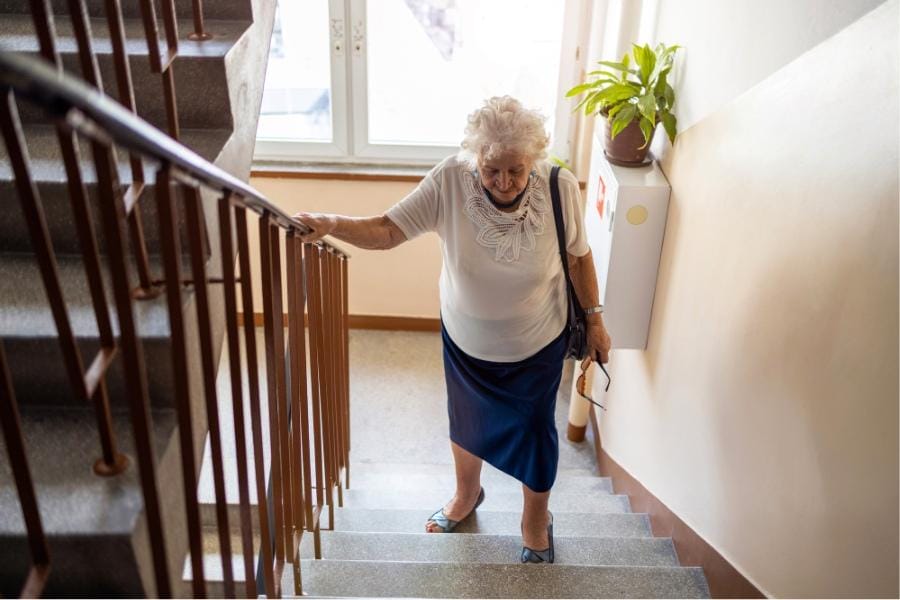Is Freezing a Symptom of Alzheimer’s?
If you or a loved one has been experiencing sudden stops or pauses during movement – known as “freezing episodes” – you might be wondering if this could be a sign of Alzheimer’s disease.
The answer is yes: freezing can indeed be associated with Alzheimer’s disease, though it’s not always an early symptom.
These concerning moments, where movement temporarily stops despite the intention to continue, can be frightening and confusing for both individuals and their families.
In this comprehensive guide, we’ll explore the connection between freezing episodes and Alzheimer’s disease, help you understand when to seek professional help, and provide practical guidance for managing these challenging symptoms.
Key Takeaways:
- Freezing episodes – where a person suddenly stops or pauses during movement – can be a symptom of Alzheimer’s disease, particularly in middle to late stages. These episodes often occur when transitioning between surfaces, approaching narrow spaces, or feeling rushed.
- While freezing is associated with Alzheimer’s, it can also be caused by other conditions like Parkinson’s disease, vascular dementia, anxiety disorders, or medication side effects – making professional medical evaluation crucial for proper diagnosis.
- Managing freezing episodes requires a multifaceted approach combining medical treatment, environmental modifications (like removing obstacles and installing handrails), and professional support from caregivers trained in mobility assistance and fall prevention.
Freezing Episodes: What They Are and Why They Happen

Freezing episodes manifest as sudden, temporary interruptions of movement that can feel like your feet are glued to the floor.
These episodes typically occur during specific situations, such as when trying to start walking, attempting to turn, or navigating through doorways.
Think of it as trying to drive a car that suddenly stalls – your brain knows where it wants to go, but the signal isn’t getting through properly.
Are you curious if it is actually an issue in mental functions?
The science behind freezing relates to how our brains process and control movement. When healthy neural pathways function properly, movement flows smoothly like a well-choreographed dance.
However, in conditions affecting the brain, including Alzheimer’s disease, these pathways can become disrupted, leading to freezing episodes.
Common triggers for freezing include:
- Transitioning between different types of surfaces
- Approaching narrow spaces
- Feeling rushed or anxious
- Attempting to do multiple things at once
- Navigating crowded or unfamiliar spaces
The Link Between Freezing and Alzheimer’s Disease
While many people associate Alzheimer’s primarily with memory loss, the disease can significantly impact movement control as it progresses.
Alzheimer’s affects multiple areas of the brain, including regions responsible for coordinating movement and spatial awareness.
This connection explains why some individuals with Alzheimer’s experience freezing episodes, particularly in the middle and later stages of the disease. People with dementia or Parkinson’s disease likely have concerns, as well.
However, it’s crucial to understand that freezing symptoms can also be related to other conditions, including:
- Parkinson’s disease
- Vascular dementia
- Normal pressure hydrocephalus
- Anxiety disorders
- Medication side effects
Recognizing Early Warning Signs and Symptoms

Early recognition of freezing episodes can make a significant difference in managing symptoms and ensuring safety.
The initial signs often appear subtly, like a gentle whisper rather than a loud announcement. You might notice:
Movement changes become more apparent when:
- Walking through doorways or narrow spaces
- Attempting to turn or change direction
- Starting to walk after sitting
- Navigating crowded areas
- Responding to unexpected situations
Family members often notice these changes before the individual experiencing them does. If you’re observing a loved one, pay attention to whether they:
- Appear more hesitant when starting to walk
- Take smaller, shuffling steps
- Show increased anxiety about moving in certain situations
- Have difficulty with transitions or turning
Impact on Daily Life and Safety Concerns
Freezing episodes can significantly affect daily activities and independence. Simple tasks like getting up from a chair or walking to the bathroom can become challenging adventures.
This impact extends beyond physical limitations – it often affects emotional well-being and social interactions.
Safety becomes a primary concern, as freezing episodes can increase the risk of falls. Creating a safer environment involves:
- Removing obstacles and clutter from walkways
- Installing handrails in key areas
- Ensuring adequate lighting throughout the home
- Using non-slip mats and removing loose rugs
- Organizing furniture to create clear paths
Bonus: Learn about how Parkinson’s Disease affects memory.
Getting Professional Help and Diagnosis

When freezing episodes begin to affect daily life, it’s crucial to seek professional medical evaluation. You may be thinking it is a body disease, advanced dementia, or different types of dementia.
Early assessment can help determine the underlying cause and guide appropriate treatment strategies. The diagnostic process typically involves:
A comprehensive evaluation by healthcare professionals who will:
- Take a detailed medical history
- Perform physical and neurological examinations
- Conduct cognitive assessments
- Order appropriate imaging studies
- Evaluate medication effects and interactions
Treatment Options and Management Strategies
Managing freezing episodes as it relates to cognitive function requires a multi-faceted approach, combining medical treatment with practical strategies.
Healthcare providers may recommend:
- Physical therapy to improve balance and mobility
- Occupational therapy for daily living adaptations
- Medication adjustments if appropriate
- Regular exercise programs
- Environmental modifications
Professional caregivers or in-home nurses, particularly those experienced with Alzheimer’s and movement disorders, play a crucial role in implementing these strategies. They can provide:
- Consistent support during daily activities
- Expert guidance on preventing falls
- Regular monitoring of symptoms
- Communication with healthcare providers
- Peace of mind for family members
- Assistance with medication
Support and Care Resources for Individuals and Families
The journey of managing freezing symptoms alongside Alzheimer’s disease isn’t one you have to walk alone.
Professional support can make a significant difference in both safety and quality of life. Specialized nurses and caregivers understand the unique challenges that come with freezing episodes and can provide invaluable assistance.
Professional care teams offer several key advantages:
- Expertise in recognizing and responding to freezing episodes
- Knowledge of effective movement strategies
- Experience in preventing falls and injuries
- Understanding of both physical and emotional needs
- Ability to adapt care as symptoms change
When selecting professional care support, consider these essential factors:
- Experience with Alzheimer’s and movement disorders
- Training in fall prevention and safety measures
- Ability to provide consistent care
- Communication skills with both patients and families
- Flexibility in adapting to changing needs
At NurseRegistry, our specialized care services are designed to address the unique challenges that come with freezing episodes and Alzheimer’s disease. Our professional nurses are trained to:
- Implement effective mobility assistance techniques
- Monitor and document symptom changes
- Coordinate with healthcare providers
- Provide emotional support and encouragement
- Train family members in safe assistance methods
Support Options
Finding the right support system extends beyond professional care. Community resources and support groups can provide additional assistance and emotional support. These might include:
- Local Alzheimer’s Association chapters
- Memory care support groups for cognitive decline
- Senior community centers for social activities
- Adult daycare programs that support physical activities
- Transportation assistance services
Practical Tips for Daily Living

Living with freezing episodes or late-stage Alzheimer’s requires adaptation, but there are several strategies that can help maintain independence and safety:
Movement Strategies:
- Use visual cues like lines on the floor
- Practice rhythmic stepping in place before walking
- Take wider turns instead of sharp pivots
- Allow extra time for activities
- Use assistive devices when recommended
Communication Tips:
- Inform others about freezing episodes
- Share successful management strategies with caregivers
- Keep a symptom diary to share with healthcare providers
- Maintain open dialogue with family members
- Don’t hesitate to ask for help when needed
Looking Ahead: Hope and Help
While freezing episodes can be challenging, understanding their connection to Alzheimer’s disease and having access to proper support can make a significant difference in managing symptoms and maintaining quality of life.
Remember that each person’s experience is unique, and what works best for one individual may need to be adjusted for another.
Professional support, whether through specialized nursing care or other healthcare providers, plays a crucial role in managing these symptoms effectively. The right care team can help you or your loved one navigate the challenges of freezing episodes while maintaining dignity and maximizing independence.
If you’re noticing freezing episodes in yourself or a loved one, don’t wait to seek help.
Early intervention and proper support can make a significant difference in managing symptoms and ensuring safety.
Take the First Step
If you’re concerned about freezing episodes and their potential connection to Alzheimer’s disease, we encourage you to:
- Document when and where freezing occurs
- Share your observations with healthcare providers
- Consider professional care support
- Make necessary home safety modifications
- Build a strong support network
At NurseRegistry, we understand the challenges that come with managing freezing episodes and Alzheimer’s disease.
Our experienced nurses are here to provide the support, care, and guidance needed to help you or your loved one maintain safety, dignity, and quality of life. Contact us to learn more about how our specialized care services can help address your specific needs and concerns.
Remember, while freezing episodes can be alarming, proper understanding and support can make a significant difference in managing these symptoms effectively. With the right care team and support system in place, you can face these challenges with confidence and hope.
The post Is Freezing a Symptom of Alzheimer’s? appeared first on NurseRegistry.The post Is Freezing a Symptom of Alzheimer’s? appeared first on NurseRegistry.
from NurseRegistry https://ift.tt/pTr4uQ3

Comments
Post a Comment